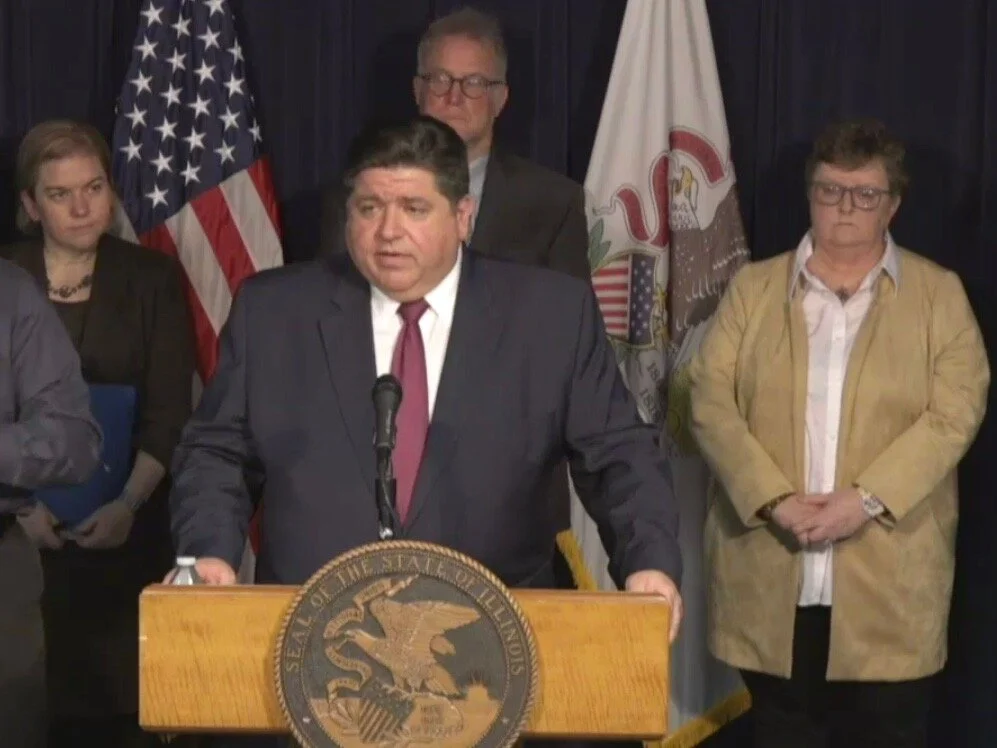Pritzker OKs disaster proclamation on COVID-19
‘Operational procedure’ is ‘staying ahead’ of coronavirus as four new cases bring state total to 11
Gov. Pritzker heads a news conference on the coronavirus Monday at the Thompson Center in Chicago. (Illinois Information Service)
By Ted Cox
The governor issued a disaster proclamation Monday afternoon on the coronavirus in what he called an “operational procedure” meant to prepare state agencies for a robust response to the disease.
Gov. J.B. Pritzker made the announcement at the Thompson Center in Chicago as the state announced four new cases on COVID-19 in Illinois, bringing the total to 11.
Counseling calm, Pritzker nonetheless warned Illinoisans, “This is going to affect your daily life.”
“The disease is not circulating widely in our communities at this time,” said Dr. Ngozi Ezike, director of the state Department of Public Health. But she warned state residents to be prepared for possible preventive measures including school closings and disruptions in public transportation.
Pritzker emphasized that the disaster proclamation was mainly a procedural move allowing use of the State Disaster Relief Fund and clearing the way for federal disaster funding, as well as other possible responses including drawing on Illinois National Guard reservists, especially doctors and nurses. “It’s staying ahead of this,” he said.
“As we’ve said from the beginning, the state of Illinois will use every tool at our disposal to respond to this virus, and this is the next step in that commitment,” Pritzker added. “We stand ready to put the full weight of state government in preparation for a full-fledged response when needed and will continue to update the public regularly, responsibly and honestly as the situation evolves.”
“This is another piece of looking ahead and being prepared,” said Dr. Allison Arwady, Chicago’s commissioner of public health. She added that it was “not surprising” that four additional cases were confirmed Monday, and she pointed out that two of those newly diagnosed with the disease were family members of the sixth person identified last week, a teacher’s aide at Vaughn Occupational High School in Chicago. She said all those who’ve been identified as coronavirus patients in Illinois are reported to be in “good condition.”
“As always, we are following the science on this,” Arwady added.
According to a news release put out by the Governor’s Office, “the first two cases in the state announced last month have recovered without known transmission to additional individuals. The remaining patients are in isolation either at home or in a hospital.”
Pritzker and health officials repeated that COVID-19 is a respiratory infection spread much like influenza, although it has a much higher mortality rate, and precautions are much the same:
Wash your hands frequently with soap and water for at least 20 seconds.
Cover your cough or sneeze.
Avoid touching your eyes, nose, and mouth.
Clean often-touched surfaces frequently.
Maintain social distance (3 feet) between yourself and anyone who is coughing or sneezing.
Avoid visiting long-term-care facilities, such as nursing homes, especially if you’re sick.
Stay home if you do not feel well.
Plan a safe visit to the doctor if you experience any symptoms, and call your doctor first.
They added that vulnerable populations — including people 60 years and older or those with certain health conditions like heart disease, lung disease, and weakened immune systems — are recommended to avoid large gatherings.
The state has three testing labs in Chicago, Springfield, and Carbondale, and Pritzker said he expected testing facilities to expand. He also said he’d received assurances from the top insurance companies in the state to cover treatment for the coronavirus, including testing.
The Pritzker administration will begin holding daily updates on the coronavirus on Tuesday.
U.S. House Speaker Nancy Pelosi and Senate Minority Leader Chuck Schumer called over the weekend for paid sick leave to be part of the federal government’s response to the outbreak, which began in China and quickly spread to every other continent but Antarctica. Pritzker expressed support for that, but given the slow workings of the government in Washington, D.C., he said the state was also considering expanded unemployment insurance for workers idled by the outbreak.
Pritzker urged state residents, “Don’t let fear replace level-headedness.”

